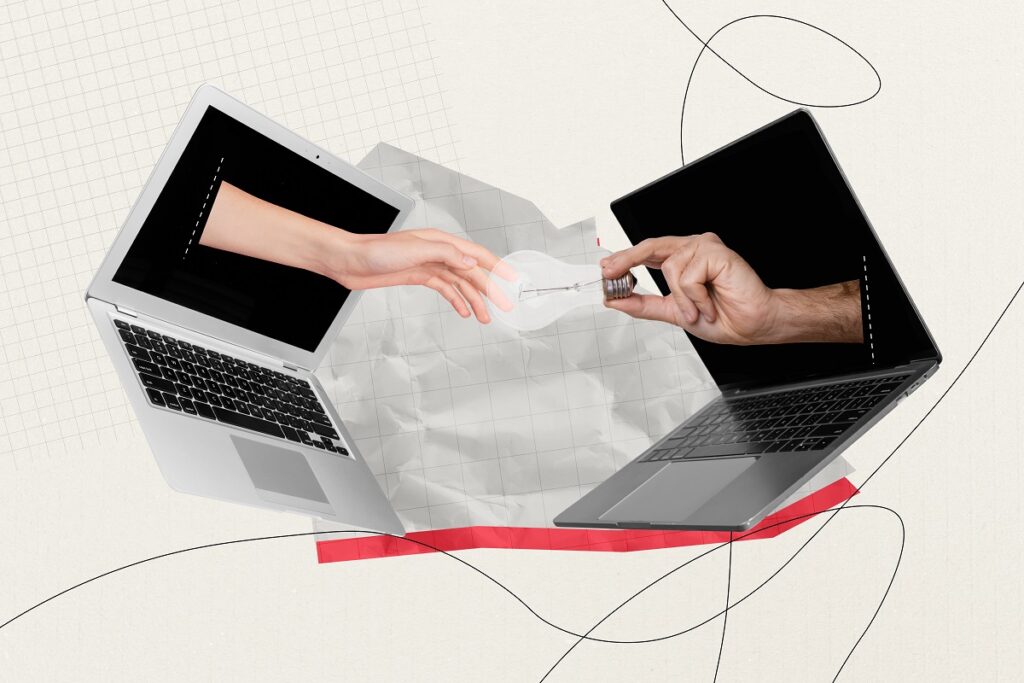Casual chats by the coffee machine or impromptu hallway conversations used to be a big part of what made workplaces tick. These little moments sparked creativity, built connections and boosted morale.
But with more people working remotely or in hybrid setups, those interactions have evolved. According to Emmanuelle Léon and Yaëlle Amsallem, both academics at ESCP Business School and part of the Reinventing Work Chair, companies must be more intentional about fostering these connections if they want to keep their culture and productivity strong.
You can’t have a company culture without interactions. It’s not something you can write down on paper. It’s how people behave with each other.
From water cooler to Zoom
Before the Covid-19 pandemic struck in 2020, most workplace interactions happened naturally — catching someone in the hallway or at the water cooler. Now, with remote work, those unplanned moments are rare. “We’ve moved to a place where even unintentional meetings need to be scheduled,” says Emmanuelle Léon, an associate professor of human resource management at ESCP’s Paris campus and scientific director of the Reinventing Work Chair.
It may sound strange, but to create spontaneous interactions in this new reality, the researchers say you actually have to plan for them.
Yaëlle Amsallem adds that it’s often these unplanned, casual moments that lead to major decisions or innovative ideas that can drive real business benefits. “What we are missing now are those spontaneous relationships where important ideas are exchanged,” explains the postdoctoral researcher at ESCP. These interactions play a crucial role in fostering both culture and creativity.
Spontaneous conversations — whether in the cafe or during a quick chat — often spark new ideas and lead to problem-solving that formal meetings might miss. Both researchers say these casual moments help build rapport, trust and team cohesion, all of which are crucial for creativity and innovation, research shows.
Plan for creativity and connection
In remote work, the challenge is to create those moments intentionally, even when they don’t happen naturally. They aren’t just about being social — they’re crucial for company culture. “You can’t have a company culture without interactions,” says Emmanuelle Léon. “It’s not something you can write down on paper. It’s how people behave with each other.” Without regular interactions, employees may struggle to understand the culture or feel fully engaged with the company.
Yaëlle Amsallem, who completed her PhD at ESCP, agrees, pointing out that while individual performance might improve with remote work, the overall performance of the organisation can suffer. “A key factor in ensuring collective performance is fostering a strong organisational culture,” she says. That culture is built through constant communication and maintaining strong connections.
A key factor in ensuring collective performance is fostering a strong organisational culture.
Making interactions meaningful
So, how do we create these meaningful interactions when we’re not all in the same office together? Emmanuelle Léon stresses that there’s no “one-size-fits-all” solution, but there are strategies companies can try. For example, she says some businesses are redesigning their offices to encourage more casual encounters.
At WeWork’s London offices, the co-working company has replaced some individual desks with more open “collaboration hubs”. The goal? To get people mingling more, and strengthen company culture through informal chats and teamwork.
Other companies are scheduling dedicated in-person days, where employees come together to interact more freely. A good example is Core Digital Media in Los Angeles. Employees there are required to come into the office twice a week, on Tuesdays and Wednesdays, while the rest of the week is flexible for remote work. This hybrid setup aims to strike a balance between focused remote work and in-person collaboration, helping to strengthen team relationships.
“Companies are starting to realise that they’re missing the oil that keeps the engine running,” says Emmanuelle Léon. “Those little interactions are what make everything work.”
Rethinking office spaces
One way companies are tackling this is through smarter office design. “There’s a lot of work in environmental psychology about how to create spaces that encourage interaction,” says Emmanuelle Léon. Whether it’s making sure people pass each other on their way to the coffee machine or positioning the elevators in ways that encourage conversation, she says companies are getting creative.
However, just putting people together isn’t enough. “Did you make a bunch of new friends on the subway this morning just because you were close to them?” Emmanuelle Léon asks. The proximity may help, but it doesn’t guarantee connection. Companies need to think more about team-building activities and how they can create meaningful bonds between employees.
Team size and duration of projects also matter. Emmanuelle Léon points out that smaller, longer-term teams tend to build stronger relationships. “It’s harder to create connections in a big team working together for a short time,” she says.
Looking ahead
As remote and hybrid work become the new norm, companies need to rethink how they foster connections. The need for human connection remains essential.
“Intentionality is the key,” says Emmanuelle Léon. Whether it’s through thoughtful office design, team-building, or simply making time for informal chats, companies can adapt to ensure employees stay engaged and connected. In a world where we’re no longer bumping into each other at the water cooler, creating space for meaningful interactions is more important than ever.
The big takeaway? Building strong relationships and fostering a positive workplace culture isn’t something that just happens anymore — you have to plan for it.
